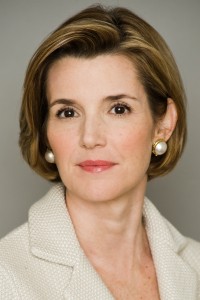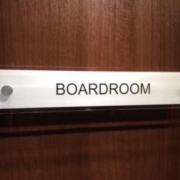Sallie Krawcheck, CEO of Ellevate speaks at Barnard College
 Sallie Krawcheck, for those who don’t know, is now the CEO of Ellevate – a women’s professional network, with its tens of thousands of women members around the world formerly known as 85 Broads. She seems almost archetypal as she tells her story, in a wood-paneled room at Barnard College earlier this year (February 2015), where she is speaking to a group of young would-be entrepreneurs. Confident, laid-back and very funny, she describes her dramatic trajectory in the world of finance. For those of you who don’t know Sallie’s journey; she graduated from UNC Chapel Hill, and got a job on wall street, did an MBA at Columbia and before long was Institutional Investor magazine’s top-ranked equity analyst.
Sallie Krawcheck, for those who don’t know, is now the CEO of Ellevate – a women’s professional network, with its tens of thousands of women members around the world formerly known as 85 Broads. She seems almost archetypal as she tells her story, in a wood-paneled room at Barnard College earlier this year (February 2015), where she is speaking to a group of young would-be entrepreneurs. Confident, laid-back and very funny, she describes her dramatic trajectory in the world of finance. For those of you who don’t know Sallie’s journey; she graduated from UNC Chapel Hill, and got a job on wall street, did an MBA at Columbia and before long was Institutional Investor magazine’s top-ranked equity analyst.
Integrity has always been important to her and her guidance to the firm of which she had become CEO, Sanford C Bernstein, was cited as a major reason why this firm withdrew from the underwriting business. This was one of the decisions that caused Fortune to identify her in 2002 as “The Last Honest Analyst.”
Chutes and Ladders
From there she began her swift ascent. Krawcheck seemed for years after to have a golden career. She was tapped for top leadership at the major banks: from Smith Barney to Merrill Lynch to US Trust. Others followed: In 2005, Forbes named Krawcheck as number seven on its list of The World’s 100 Most Powerful Women. Most recently, Krawcheck was named #9 on Fast Company’s list of the 100 most creative people of 2014.
But it was not all a clear flight path. When a commentator at a recent lecture of hers, at which she shared her insights for younger women who wish to learn from her journey, pointed out that Krawcheck “rose faster and higher than any woman on Wall Street,” Krawcheck replied, with disarming candor, “and fell.”“I rose swiftly and I fell….It isn’t all a straight line. And you will fall – get back up. I just refused to go away.” Krawcheck expanded further on the idea of resilience as a necessary quality for women in leadership. But often women don’t, her questioner pointed out– they might take a setback or professional rejection personally, or feel demotivated. Krawcheck conceded: “It hurts. I ran Smith Barney – I was fired from that. I’m the only woman who has been fired on the front page of the Wall Street Journal two times. It hurts.” Krawcheck continued, “To me you live one life,” she went on, pushing back gently, in a way that felt quite inspiring. “You get one opportunity. You grab it with both hands – the worst thing that can happen is that you fail. To me that is not such a bad alternative.”
She notes that her worst day is better than the days of 99% of the rest of the world. “When you have that lens,” she concludes, “it is not “poor me.” It gives you perspective when you keep in mind where the rest of the world is compared to our good fortune.”
Best Advice
Krawcheck shared three insights, in addition to work your tail off.
Number 1: “Network, network, network.”
She points out that young women say, `“I don’t want to use a connection – I just want to be recognized for myself.”’ The assumption, “”If I just keep my head down and do good work I will be recognized” is, Krawcheck warns, a common myth among women. “There is no HR fairy godmother”,” she declared to roars of laughter and applause. “Who you know is what you know,” she emphasized. “The guys know a lot of people. We need to know a lot of people.” She presents fascinating data that reveal that women don’t see the power of networking until their 30s – by which time the men have moved ahead.
Number 2: “Keep Learning”
The number of women her age, she says, who proclaim, “Oh I don’t get Facebook!” “Well, Facebook is not going anywhere,” she remarked drily, to more laughter. Or “I’m not on LinkedIn” – to which she retorted, “Why? You don’t want anyone to find you?” She pointed out that her ability to find and acquire Ellevate depended on a chain of ten connections.
Number 3: “Avoid Groupthink”
The third insight that she shared that day, is that groupthink is bad for the bottom line, and that in her opinion diversity helps cure groupthink. Bankers, she says, did not see the bubble coming because they were all invested in the groupthink about the sector.
Krawcheck states “Diverse teams lead to higher return on capital, lower risk and greater long term focus. Diverse teams outperform smarter teams. “
Number 4: “Share Information”
Finally she shared the insight that Ellevate’s research shows that women seek different rewards from work than men do. “Meaning and purpose” is number one for women – money is number four. So she suggests that a goal of companies that want to retain and promote women should be to bring “meaning and purpose” into their mission. She comments, “If these institutions were about meaning and purpose, not just money, It could change everything. We are not finding it [these values] in existing companies so we are creating them, and they are amazing.”
She believes that women also need community and companies need women to be in community, and she concluded that when women are in networks such as Ellevate, in which they can share information and knowledge. Sallie quoted a reduced attrition rate for these women compared to that of their peers due to network participation.
Now Krawcheck, who has been at the head of many of these traditional models of a business, is running a 21st century disruptive model, that seeks to combine revenue generation with a transformational mission of identifying and boosting women’s ventures. She is now putting these “Aha!” insights into real time practice; and this kind of project and message, as it moves ahead alongside that of other women pioneers with aligned insights – indeed“could change everything”.
By Guest Contributor Naomi Wolf on behalf of the Athena Leadership Center, a partner of theglasshammer.com











